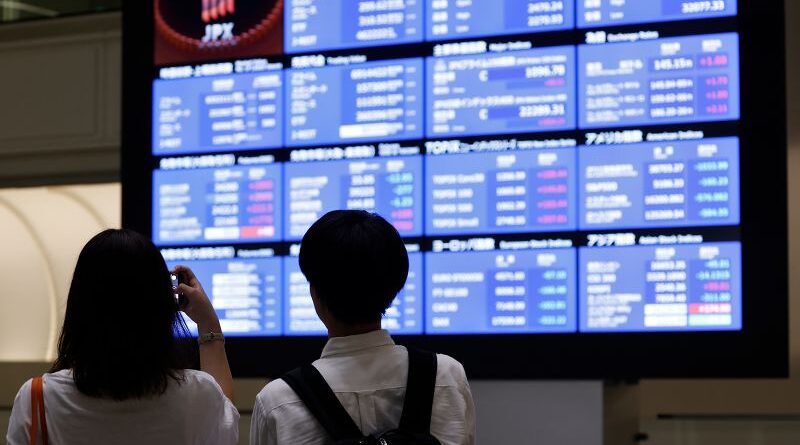Japan’s stock market ends as fears return | CNN Business
Hong Kong
CNN
–
The rally in Japanese stocks has quickly lost momentum, as sentiments of a US recession and a sharp decline in the yen have weighed on global financial markets.
The Nikkei 225 ended up 0.7% on Thursday, snapping a two-day winning streak. Meanwhile, the yen strengthened 0.6% to 146 against the US dollar, after losing almost 2% on Tuesday and Wednesday combined.
The Japanese index rose in two sessions after a surprise performance on Monday, as investors were comforted by comments from central bank officials.
But Thursday’s chill spread to Europe, with the regional Stoxx Europe 600 Index down 1% at 3.43 am ET. Germany’s DAX and France’s CAC 40 were down 0.8% and 1% respectively, while London’s FTSE 100 was down 1.1%.
US futures also pointed to a weak start for stocks on Wall Street. S&P 500 futures were down 0.5% and Nasdaq futures were down 0.4%.
On Wednesday, Bank of Japan (BOJ) deputy governor Shinichi Uchida said policymakers will not raise interest rates “when financial markets are unstable.” He sought to calm nerves after expectations that Japan would continue to tighten monetary policy sent markets tumbling on Monday.
The yen’s rise, which began when the BOJ signaled a hawkish stance on monetary policy in recent weeks, has forced many hedge funds and other investors to cut back on so-called carry trades, a policy a popular investment that involved borrowing money at a very low cost in Japan. invest in other markets. That change added to the decline in global markets.
Uchida said on Wednesday that he believed that the US economy would reach a soft level even as concerns were raised that the Federal Reserve had cut back on inflation.
But That fear, along with a further jump in the yen’s value, is troubling the market.
“The possibility of a deep recession in the US economy, misguided global monetary policies and escalating political tensions in the Middle East are casting long, ominous shadows on financial markets,” said Stephen Innes, managing partner of SPI Asset Management.
The volatility in the The yen, which was at the heart of the recent market turmoil, is still high, he added.
On Monday, the Nikkei fell to its worst since 1987, triggering a broad sell-off in global markets.
While the BOJ’s deputy governor has scaled back on near-term policy hikes, his words were not intended to reverse monetary policy, said Alex Kuptsikevich, senior market analyst at FxPro.
In Japan, inflation is now close to the 2% target. set by the BOJ for about two years, which allows the central bank to end the period of zero interest rates. Meanwhile, the Federal Reserve faces slowing inflation and a cooling labor market, and is widely expected to cut rates at its meeting in September.
A narrowing of the interest rate differential, which had eased yen trading, could push the yen higher, Kuptiskevich said.
If the US enters recession and is aggressively fired by the Fed, “we would not be surprised to see (the dollar) fall to 120 (yen) or below,” Masamichi Adachi, chief Japanese economist at UBS , he wrote on Wednesday.
Going forward, the global business environment remains unpredictable with many uncertainties lurking in the shadows, Innes said.
He added: “The US political election is just around the corner, and it could turn the markets into a chaotic pit rather than a nice waltz.”
UBS Chief Investment Office analysts wrote on Thursday that, with just three months to go before Election Day, the race is too close to call.
They wrote: “We urge investors to avoid making big bets on the outcome of the election now.”
In other Asian markets, South Korea’s Kospi closed down 0.5%, also snapping two-day gains. Taiwan’s Taiex ended down less than 2%. Hong Kong’s Hang Seng was recently bought an apartment.
#Japans #stock #market #ends #fears #return #CNN #Business

